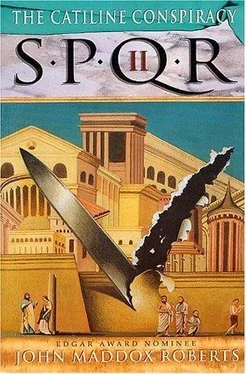John Roberts - The Catiline Conspiracy
Здесь есть возможность читать онлайн «John Roberts - The Catiline Conspiracy» весь текст электронной книги совершенно бесплатно (целиком полную версию без сокращений). В некоторых случаях можно слушать аудио, скачать через торрент в формате fb2 и присутствует краткое содержание. Жанр: Исторический детектив, на английском языке. Описание произведения, (предисловие) а так же отзывы посетителей доступны на портале библиотеки ЛибКат.
- Название:The Catiline Conspiracy
- Автор:
- Жанр:
- Год:неизвестен
- ISBN:нет данных
- Рейтинг книги:3 / 5. Голосов: 1
-
Избранное:Добавить в избранное
- Отзывы:
-
Ваша оценка:
- 60
- 1
- 2
- 3
- 4
- 5
The Catiline Conspiracy: краткое содержание, описание и аннотация
Предлагаем к чтению аннотацию, описание, краткое содержание или предисловие (зависит от того, что написал сам автор книги «The Catiline Conspiracy»). Если вы не нашли необходимую информацию о книге — напишите в комментариях, мы постараемся отыскать её.
The Catiline Conspiracy — читать онлайн бесплатно полную книгу (весь текст) целиком
Ниже представлен текст книги, разбитый по страницам. Система сохранения места последней прочитанной страницы, позволяет с удобством читать онлайн бесплатно книгу «The Catiline Conspiracy», без необходимости каждый раз заново искать на чём Вы остановились. Поставьте закладку, и сможете в любой момент перейти на страницу, на которой закончили чтение.
Интервал:
Закладка:
"Whatever pleasure is to be had in watching it flow by is mine," I told him. "I assure you, that is very little pleasure indeed."
"Then let me cheer you up. Come with me."
He led me to a small room equipped with a single table and two small dining-couches. Next to them was a bronze basket filled with glowing-red stones that had been heated in a baker's oven. This provided heat without smoke, for which I was grateful. The afternoon had grown cool. The table was furnished with cups and a pitcher of wine and snacks of the simplest sort: olives, nuts, dates and figs. This represented not a philosopher's love of simplicity but rather a busy man's lack of time for any sort of ostentation.
We drank each other's health and passed a few pleasantries between us. Then Milo spoke in his usual, direct fashion.
"Much as we always enjoy each other's company, I take it that this is by way of being an official visit?"
"Not precisely. That is to say, it doesn't involve my present office. I've come upon evidence of a possible conspiracy against the state, and I am not sure what to do with it. I know of no one totally trustworthy in whom to confide."
"Except me." He smiled.
"You come closest," I admitted.
"Then tell me about it."
Milo was not a man with whom to prevaricate, or speak in circumlocutions or innuendo. I told him exactly what I had found and where I had found it. I told him my reasons for not going to the Consuls or praetores. He listened with great concentration. Milo did not have the most brilliant mind I ever encountered; that laurel would have to go to Cicero. But I never knew a man who could think harder than he did.
"I can understand your urge to caution," he said when I had finished. "So you suspect a plot against the state?"
"What else could it be?" I asked.
"I know that you have fears that Pompey will make himself king of Rome, but somehow I don't see him arming a few hundred scruffy supporters to hold the gates for him. If he truly wanted to, I think he could bring his armies to Italy and walk into the city unopposed."
"There are plenty of others, besides Pompey," I pointed out. "Men who once commanded legions and know they will never have the chance to do so again. Men who have been disappointed in their bids for high office. Men who are desperate. Who else?"
"The weapons you describe would not be much use in arming soldiers for the field, but they are just the thing for fighting in a city. No heavy shields or armor, no long pikes, no bows or arrows. They might be used as you fear, but there is another possibility."
"I would be glad to hear of it," I said.
"Decius, you have allowed these fears of overambitious generals to dominate your thinking. Those men have learned from what happened in the days of Marius and Sulla. I think that, in the future, they will do most of their fighting outside of Italy. But there are other men who have no ambition to command great armies and lord it over the provincials. These men want to control Rome itself, just the city. Such a cache as you describe would be of great use to one of those."
"And who," I said, "might this person be?"
"Clodius Pulcher comes immediately to mind," he said.
"And you would be another. No, it is tempting, and that makes me even more skeptical. There is nothing in the world I would love more than to impeach Clodius before the Senate. It would rid the Republic of a despicable cur and, incidentally, make my name in politics. For that reason, I can hardly believe that the gods have dropped this opportunity in my lap. I will not, of course, suggest that you might have had anything to do with this."
"Give me credit for greater subtlety. Then let us go back to the idea of a malcontent itching for a coup. It wouldn't be just one malcontent. They have a way of finding one another and talking about how unjustly they have been treated."
"Why the Temple of Saturn?" I asked him.
"It is a good location, near the Forum. It has, as you found out, disused storerooms nobody ever looks into. The treasury is always securely locked but the temple itself is open. It will only be one of several caches, you know. Keep an eye on the one in the temple and see if there are more deposited there in the next few days. But don't let anyone see you do it. I would hate to hear that you were found dead in the street one morning, like poor Manius Oppius." He would have known of the murder within minutes of the body's being found. I only hoped that he had not known of it before.
"I passed by the murder scene this morning," I told him. "I took charge until the Iudex Octavius arrived. Do you know anything about the man?"
"He was a banker, like a lot of that family. I didn't know him, but I know plenty of people who owed him money."
"There will be no shortage of suspects, then," I said.
I took the dagger from beneath my tunic and un-wrapped it. "This is what he was killed with. Have you ever seen one like it?"
He turned the knife over in his hands, ran his thumb along the carved serpent. Then he shook his head. "It's no national type I know of. Not even very good work. If I were going to murder a man, I'd probably go to a market, pick up a thirdhand weapon like this from a junk dealer, use it once and leave it where it was or toss it into the nearest storm drain." He handed it back to me. "Sorry. I suspect that whoever used this picked it because it could not identify him."
I rose. "I thank you, Milo. I still haven't decided what to do, but you have given me some things to think about."
"Stay for dinner," he urged.
"Alas, I am having dinner with the Egyptian ambassador. Ptolemy the Flute-Player is in trouble again and is cultivating every official in Rome for support. He comes here so often we ought to make him a citizen."
"Well, I won't try to keep you from a good party." He rose as well and put his hand on my shoulder as he walked me to the door. "You recall what I said about how malcontents find each other?"
"I do."
"If you really want to find out if some of them are plotting to overthrow the state, let them find you. They are always looking for others like them. Don't be too obvious, but let fall a few comments about how no good offers for post-quaestor appointments have come your way, how your highly placed and jealous enemies are thwarting your ambitions for higher office. You know how they talk. But let them think that it is they who are suborning you." He thought for a while. "You might drop some of these words where Quintus Curius may hear them."
At the door I took my leave and thanked him again. As usually happened when I had discussed something with Milo, I felt that I had been vouchsafed a special insight, making simple what had seem a thorny, difficult problem. He had a way of cutting through the dross and the distractions to reach the core of the matter. He was not bothered by the useless fears, the ethical considerations, the nonpertinent inconsequentialities that cluttered my own mind. His fixation on the acquisition and exercise of power was as intense and single-minded as those of Clodius, Pompey, Cicero, Caesar and the rest, but he was far more likable than any of them, even Caesar, who could be incredibly likable when he wanted your support.
For instance, why had I not thought of Quintus Curius? He was a penurious malcontent of the first order, a man known to have committed half the crimes on the law tables and suspected of the rest. If anything truly villainous was being plotted in Rome, he would be involved. A few years previously, the Censors had expelled him from the Senate for outrageous behavior. He came of an old and distinguished family, and so naturally thought that he was entitled to wealth, high position and public esteem. He was one of those men who simply could not understand how a new man like Cicero could have become Consul.
Читать дальшеИнтервал:
Закладка:
Похожие книги на «The Catiline Conspiracy»
Представляем Вашему вниманию похожие книги на «The Catiline Conspiracy» списком для выбора. Мы отобрали схожую по названию и смыслу литературу в надежде предоставить читателям больше вариантов отыскать новые, интересные, ещё непрочитанные произведения.
Обсуждение, отзывы о книге «The Catiline Conspiracy» и просто собственные мнения читателей. Оставьте ваши комментарии, напишите, что Вы думаете о произведении, его смысле или главных героях. Укажите что конкретно понравилось, а что нет, и почему Вы так считаете.










